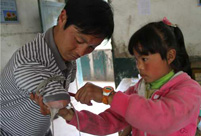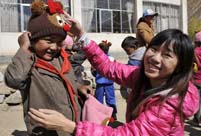"The traditional model of urbanization is not suitable for China’s national conditions. China must work out its own way of urbanization," said Li Yining, honorary dean of Guanghua School of Management of Peking University gave his opinion at 2013 Global Poverty Reduction and Development Forum held on Oct.17 in Beijing.
"China's urbanization would be divided into three parts: reform of old city urban planning, new city planning and new community building and transformation. The mode of urbanization is also called in-situ urbanization,” Li said in his speech about experiences and challenges in China’s urbanization process.
At the forum, Chinese Vice Premier Wang Yang outlined implications of China’s immense pace of urbanization, saying: “China's urbanization rate reached 52.6 percent in 2012, a 1.3 percent increase from the previous year. As we deepen reform and strive to readjust the nation’s economic structure, we must take advantage of this critical period to achieve aspirations of an all-around well-off society and introduce new means of poverty alleviation.”
Although the number of Chinese citizens living below the 1.25 dollar-a-day poverty line set by the World Bank has already decreased from 446 million in 1999 to 160 million in 2009, Wang suggested to renew efforts to find a more effective urbanization path. Strategies should emphasize urban-rural integration, continue to strengthen agriculture’s role when promoting urban development.
Wang also called for heightened poverty alleviation efforts in all regions, especially the underdeveloped western provinces. He applauded urbanization which sets improvement as a constant goal, innovates institutional practices and places people at its center.
Fan Xiaojian, director of the State Council leading group office of poverty alleviation and development of China (LGOP) proposed to accelerate the improvement of institutional mechanisms for the integration of urban and rural development, focusing on urban and rural planning, infrastructure and public services. “Better balanced urban and rural elements and public resources are keys to achieve common prosperity.”
Li Yining stressed that China’s urbanization has dual characteristics, namely development transformation and mechanism transition. Therefore, urbanization is an important part of deepening reform aiming at eradicating the 50-year-long implementation of the urban-rural dual structure and promoting urban and rural integration.
"For those industrial enterprises that have caused pollution, we should find ways to move their factories out of the old cities and devise good ways of handling and eliminating the environment problems left,” Li said. He added that old cultural relics should be protected with special attention during the reform of old cities.
He believes that in the old city transformation process, government should pay attention to the demolition of shantytowns. New city construction should be planned together with investment and the old city transformation. New urban planning should be human-oriented. It is more of a residential area rather than an industrial field.
The forum is an annual event jointly organized by the government of China and the United Nations in China. As a globally recognized platform for improving policy coherence and coordination, the event this year attracted over 300 participants from China and other countries, including Bangladesh, Botswana, Colombia, India, Iran, Laos, Malaysia, Mongolia, the Philippines, and Tanzania, among others.
"Over 95 percent of future urban expansion will take place in developing countries, mostly in Asia and Africa. China’s efforts in achieving social reforms will be watched closely around the world as other countries follow its leadership on urbanization and poverty reduction," said UN Under-Secretary-General and UNDP Associate Administrator Rebeca Grynspan.
The primary aim of the forum was to address China’s unprecedented surge of urbanization and accompanying challenges such as rural-urban migration, new types of poverty faced by disadvantaged groups, and improving public policy in a rapidly evolving development landscape. Leaders called for greater global commitment to bridging socioeconomic disparities and promoting social inclusion.
 No news of survivors in Lao Airlines crash
No news of survivors in Lao Airlines crash Five fighters in flight training
Five fighters in flight training London mayor hails free trade, subway system on China tour
London mayor hails free trade, subway system on China tour Chalk it up to great courage
Chalk it up to great courage Tibetan girl helps mobilize volunteers onlin
Tibetan girl helps mobilize volunteers onlin Photo story: A day in the life of a car model
Photo story: A day in the life of a car model Chinese screen goddesses from Beijing Film Academy
Chinese screen goddesses from Beijing Film Academy  Weekly Sports Photos
Weekly Sports Photos World's most amazing yacht on display in Guangzhou
World's most amazing yacht on display in Guangzhou Bayi Parachute Team of PLA Air Force
Bayi Parachute Team of PLA Air Force Cold air sweeps through N China
Cold air sweeps through N China The last family in shantytowns
The last family in shantytowns UNESCO world heritage site: Montale Tower
UNESCO world heritage site: Montale Tower U.S. Senate leader announces bipartisan deal
U.S. Senate leader announces bipartisan deal Fiber-optic wedding dress show shinning in Suzhou
Fiber-optic wedding dress show shinning in Suzhou Day|Week|Month